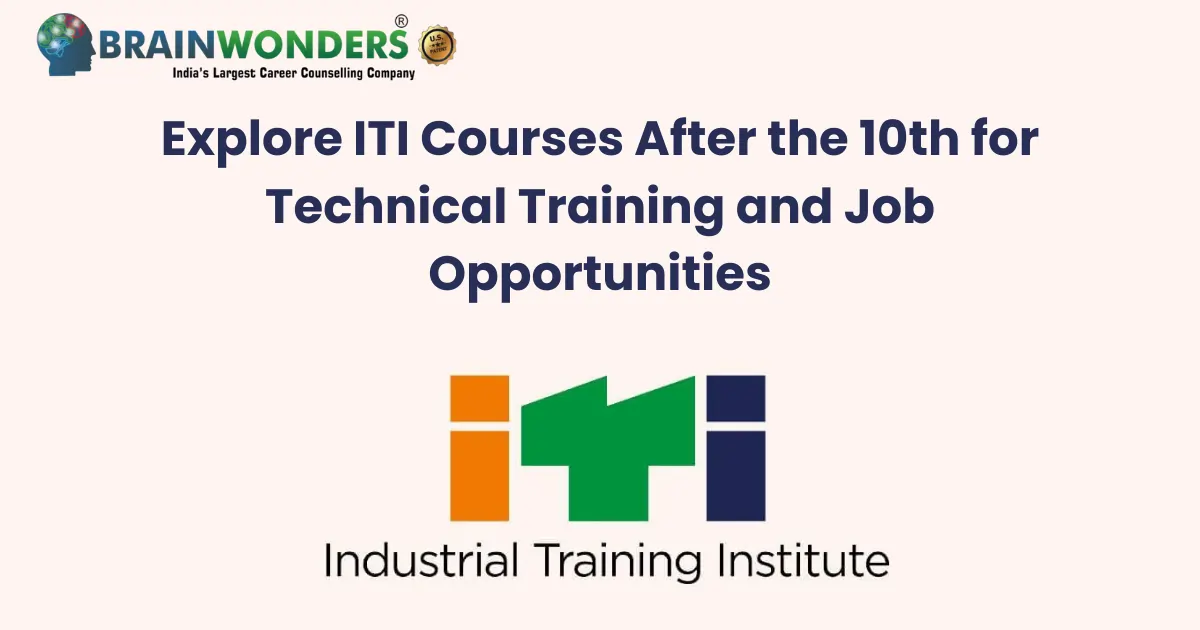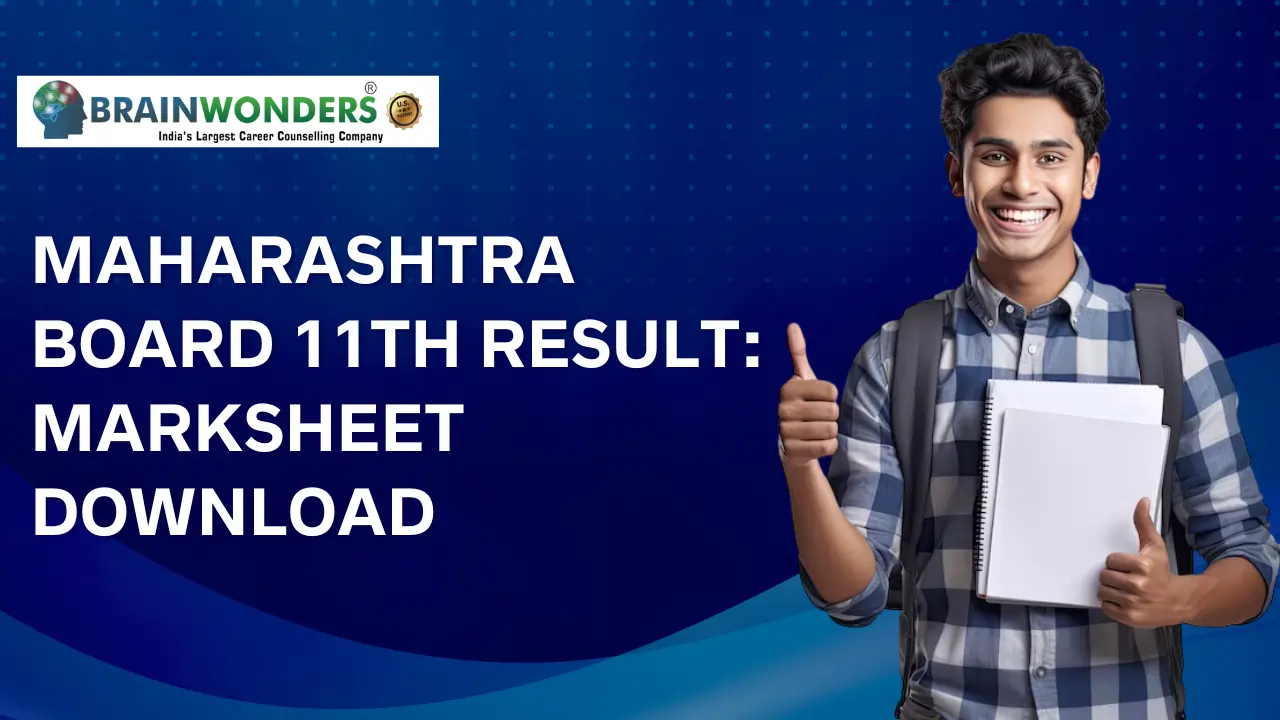

Take Brainwonders Career Test and make the right decisions for your college and course ahead
Get your U.S. Patented DMIT analysis and lead the way to a happy and successful career
Blog
14 December,2024 | By Brainwonders

The structure of Education in India is that students are forced to select a particular stream after passing their 10th standard. Still, most students need clarification on their career goals and get confused regarding their stream of study. Today, the field of Information Technology, abbreviated as IT, has attracted a lot of interest among students, especially because of the huge job market for IT professionals. ITI courses after the 10th can be one of the most rewarding careers for students who want to develop a career in the Information Technology field.
Industrial Training Institutes, abbreviated as ITI, are government institutions offering technical training and education. ITI Courses after the 10th standard help students aim for a particular sector in the IT industry. These courses vary from short and certificate courses to those that accord diplomas and span from programming languages, web designing, networking, hardware, and software maintenance, among others.
This way, the main factor in carrying out ITI courses after the 10th is that students get various opportunities while having a career. Indeed, as more and more established companies apply information technologies to their business functions and processes, a higher demand for IT specialists is created. ITI courses after the 10th enable candidates to develop their skills and knowledge to gain employment in the IT sector and develop the IT industry.
Most students need to be informed of their further courses of action or what education they should pursue once they finish the 10th standard. The one emerging option is to go for ITI (Industrial Training Institute) courses. These technical courses entail practical training and education in different industrial areas encompassing information technology. This paper, therefore, addresses the following question: Why should students pursue ITI courses after 10th, and is this path a valid form of education?
The following are the advantages of studying ITI courses after class 10 the following benefits:
In this sense, the ITI courses in the wake of the 10th can be defined as rather practical throughout, providing the students with all necessary prerequisites to secure a job in information technologies and other industries. These courses offer practical training bridging the academic education and actual working experience, a job-oriented curriculum, an affordable cost, and recognition from the government, making them very attractive to students wanting to secure a good job immediately after high school.
| ITI Courses After 10th | Duration | ITI Courses After 10th | Duration |
| Electrician | 2 years | Fitter | 2 years |
| Mechanic (Motor Vehicle) | 2 years | Mechanic (Diesel) | 2 years |
| Mechanist | 2 years | Turner | 2 years |
| Instrument Mechanic | 2 years | Electronics Mechanic | 2 years |
| Refrigeration and AC | 2 years | Draughtsman (Civil/Mechanical) | 2 years |
| Computer Assistant and Programming Assistant | 1 year | Hair and Skin Care | 1 year |
| Food Production (general) | 1 year | Front Office Attendant | 1 year |
Tuition fees for ITI courses depend on some factors, such as the type of course and the nature of the institution. Usually, government ITI colleges are cheaper, charging between INR 1,000 and INR 20,000 for a year’s tuition. On the other hand, the fee structure in private ITI colleges varies from INR 5,000 to INR 1,00,000, depending on the college.
Such discrepancies are due to the type, quality and provision of other infrastructural and physical features of the institutions offering the programs. These factors influence the choices made by aspiring students to satisfy their educational as well as financial needs. Lastly, the flexible fee structures increase access to technical education for people in need and reach everyone’s pocket in India.
And that is why many choices can be found for those who want to take ITI courses after completing 10th, right? Don’t worry! It is also important to have some of the best hand picked ITI courses after 10th that you need to know. Now, let us discuss one of these ITI courses in detail, along with factors such as eligibility, duration, colleges/split into duration and fees structure, jobs and its mean wage.
Before the students can enter the practical aspect of installing, maintaining and repairing both residential and industrial electrical systems in residential, commercial and industrial locations, they must take the Electrician course. The course outlines here should enable the student to have the technical knowledge as well as practical skills needed. Electrical safety, electrical circuits, electrical machinery, electrical measurement, and electrical installation are some of the topics made available in the course.
Below, you will find all the necessary information concerning electrician ITI courses after the 10th standard.
| Eligibility | The eligibility criteria for the Electrician course after 10th is a minimum age of 14 years and a pass in 10th standard or equivalent from a recognised board. |
| Duration | 2 Years |
| Top Colleges | Government ITI, Delhi Government ITI, Mumbai Government ITI, Bangalore Government ITI, Chennai Government ITI, Hyderabad |
| Fees | 5,000 – 20,000 |
| Job Opportunities | Electrician Electrical Supervisor Electrical Engineer Electrical Technician Maintenance Electrician |
| Average Salary | 2.5 – 4 LPA |
The Fitter course aims to impart technical intelligence and expertise related to mechanisms and actual working abilities as far as erector and machinist work is concerned. Topics that are discussed in the course include fitting techniques, lathe operations, milling operations, drilling operations, and welding.
| Eligibility | The eligibility criteria for the Fitter course after 10th is a minimum age of 14 years and a pass in 10th standard or equivalent from a recognized board. |
| Duration | 2 Years |
| Top Colleges | Government ITI, Delhi Government ITI, Mumbai Government ITI, Bangalore Government ITI, Chennai Government ITI, Hyderabad |
| Fees | 5,000 – 20,000 |
| Job Opportunities | Fitter Maintenance Fitter Mechanical Engineer Mechanical Technician Production Supervisor |
| Average Salary | 2.5 – 5 LPA |
A vocational training course known as Mechanic (Motor Vehicle) ITI Course aims at training students on aspects such as Mechanical systems/parts & Accessories of motor vehicles. Some of the topics are engine systems, transmission systems, brake systems, suspension systems, electrical systems, fuel systems, and much more. Regarding these systems, students are taught how to use various tools and approaches in order to detect possible problems and fix them.
| Eligibility | To be eligible for Mechanic (Motor Vehicle) ITI Courses after 10th, students need to have completed their 10th standard (or equivalent) from a recognized board with a minimum of 50% marks. Some institutes may also have specific age criteria for admission. |
| Duration | 1-2 Years |
| Top Colleges | Industrial Training Institute (ITI) Government Polytechnic College Don Bosco Technical Institute Aryabhatta Industrial Training Institute Bhagwan Mahaveer Industrial Training Institute |
| Fees | 10,000 – 50,000 |
| Job Opportunities | Motor Vehicle Mechanic Motor Vehicle Technician Automotive Service Technician Automotive Technician |
| Average Salary | 2.5 – 4 LPA |
Turner is a vocational training program that teaches the fundamentals of motor vehicle mechanical systems to the learners. Some of the areas that the course comprises include lathe machine operations, milling, shaping, grinding, and drilling. The students learn how to use and maintain the lathe machines used in the automobile industry and manufacture parts for motor vehicles.
| Eligibility | Students need to have completed their 10th standard (or equivalent) from a recognized board with a minimum of 50% marks. Some institutes may also have specific age criteria for admission. |
| Duration | 1-2 Years |
| Top Colleges | Industrial Training Institute (ITI) Government Polytechnic College Don Bosco Technical Institute Aryabhatta Industrial Training Institute Bhagwan Mahaveer Industrial Training Institute |
| Fees | 10,000 – 50,000 |
| Job Opportunities | Turner (Motor Vehicle) Machinist CNC Operator Tool and Die Maker |
| Average Salary | 2.5 – 4 LPA |
Instrument Mechanic is a vocational training course that prepares students about the electronic and electrical systems in cars. In this course, students are tutored on how to identify the faults in these systems and how to troubleshoot them using different tools and methods.
| Eligibility | Students need to have completed their 10th standard (or equivalent) from a recognized board with a minimum of 50% marks. Some institutes may also have specific age criteria for admission. |
| Duration | 1-2 Years |
| Top Colleges | Industrial Training Institute (ITI) Government Polytechnic College Don Bosco Technical Institute Aryabhatta Industrial Training Institute Bhagwan Mahaveer Industrial Training Institute |
| Fees | 10,000 – 50,000 |
| Job Opportunities | Instrument Mechanic (Motor Vehicle) Automobile Electrician Automobile Technician Automotive Service Technician |
| Average Salary | 2.5 – 4 LPA |
In refrigeration and air conditioning, students in their 10th grade ITI courses perform practical sessions to built, installation, and repair of refrigeration and air conditioning systems.
| Eligibility | Students need to have completed their 10th standard (or equivalent) from a recognized board with a minimum of 50% marks. Some institutes may also have specific age criteria for admission. |
| Duration | 1-2 Years |
| Top Colleges | Government Industrial Training Institute, Bangalore Government Industrial Training Institute, Mumbai Government Industrial Training Institute, Chennai Government Industrial Training Institute, Delhi |
| Fees | 10,000 – 50,000 |
| Job Opportunities | Refrigeration Technician Air Conditioning Technician HVAC Technician Maintenance Technician Service Technician |
| Average Salary | 2.5 LPA |
The technical trade of draughtsman (civil/mechanical) encompasses the preparation of technical sketches for construction applications. Children who have passed their tenth standard and are interested in taking courses in technology find it to be their favourite course.
| Eligibility | Students need to have completed their 10th standard (or equivalent) from a recognized board with a minimum of 50% marks. Some institutes may also have specific age criteria for admission. |
| Duration | 2 Years |
| Top Colleges | Government Industrial Training Institute, Delhi Government Industrial Training Institute, Mumbai Government Industrial Training Institute, Chennai Government Industrial Training Institute, Bangalore |
| Fees | 10,000 – 50,000 |
| Job Opportunities | Draughtsman (Civil/Mechanical) CAD Operator Design Engineer Project Manager Site Supervisor |
| Average Salary | 3 LPA |
Hair and skincare courses are academic-type curricula that stress the acquisition of relevant skills and knowledge on beauty, skincare and hair care. These courses are intended to deliver to the students skills and knowledge that permit them to be employable in the beauty and wellness sector.
More details are mentioned in the table given below.
| Eligibility | Students need to have completed their 10th standard (or equivalent) from a recognized board with a minimum of 50% marks. Some institutes may also have specific age criteria for admission. |
| Duration | 6 months – 2 Years |
| Top Colleges | VLCC Institute Lakme Academy Shahnaz Husain Beauty Institute Jawed Habib Academy |
| Fees | 10,000 – 50,000 |
| Job Opportunities | Hair Stylist Makeup Artist Skin Care Specialist Beauty Therapist Spa Manager |
| Average Salary | 3 LPA |
Food Production (general) is a technical trade that covers the production and processing of food and related products. Further, the course is quite popular amongst students who have passed their 10th standard and are keen on being employed in the food industry.
More details are mentioned in the table given below.
| Eligibility | Students need to have completed their 10th standard (or equivalent) from a recognized board with a minimum of 50% marks. Some institutes may also have specific age criteria for admission. |
| Duration | 1 – 2 Years |
| Top Colleges | Government Industrial Training Institute, Delhi Government Industrial Training Institute, Mumbai Government Industrial Training Institute, Chennai Government Industrial Training Institute, Bangalore |
| Fees | 10,000 – 50,000 |
| Job Opportunities | Food Production Supervisor Food Processing Technician Baker and Pastry Chef Chef Catering Manager |
| Average Salary | 3-5 LPA |
Being involved in serving customers or managing administrative tasks as front line staff in hotels, hospitals and other hospitality industries, the technical trade of a front office attendant (general) entails. It is one of the subjects that people interested in hospitality and have completed their tenth grade prefer.
More details are mentioned in the table given below.
| Eligibility | Students need to have completed their 10th standard (or equivalent) from a recognised board with a minimum of 50% marks. Some institutes may also have specific age criteria for admission. |
| Duration | 1 Year |
| Top Colleges | Institute of Hotel Management (IHM), Delhi National Council for Hotel Management and Catering Technology Government Industrial Training Institute, Mumbai Government Industrial Training Institute, Chennai |
| Fees | 10,000 – 50,000 |
| Job Opportunities | Front Office Assistant Receptionist Customer Service Executive Hotel Executive Guest Relations Officer |
| Average Salary | 3-5 LPA |
Below is the list of popular ITI courses after 10th for boys:
ITI courses after the 10th are a perfect chance for students to learn technical skills and gain experience in different Courses or industries. These courses are intended to prepare the students for professional training and for acquiring professional experience, hence providing job placement for the students in their various fields. This means that since there are several ITI courses one can be able to enroll for a course that meets their preferences or goals in regards to their careers.
In addition, ITI courses are cheaper and take a shorter time compared to typical degree courses, and they are so useful to students willing to start practising within a short time. All in all, there is a great deal of scope for ITI courses after the 10th for those who have an inclination towards technical trade so that they can build a successful career.
We would have been glad if we could have been able to give all the necessary information about the ITI courses after the 10th. Still have questions? Why don’t you speak to specialists from our industry? Want Career Related Services? Then contact our Professionals at Brainwonders! Don’t worry, though, because, with our counselling services offered to class 9-10 students, we can guide you through all the options within the different streams out there!
Q1. Is it worth pursuing ITI courses after the 10th?
Ans: Certain ITI (Industrial Training Institute) courses after the 10th can also be beneficial to those students seeking technical knowledge and job-oriented courses. ITI programs provide practical education in various Courses, such as electricians, mechanics, welders, and more, making people ready for certain jobs in certain sectors. But generally, it is a useful direction for acquiring very utiliseable skills in the market.
Q2. Can I pursue ITI courses after graduation?
Ans: Of course, you can do ITI courses after graduation whether you have completed your graduation in science or arts stream. ITI courses provide vocational training in different Courses , such as electrician, plumber, and welder, and are meant for employment purposes. To increase their chances of getting specific jobs, most graduates are forced to undertake ITI courses to equip themselves with the specific skills needed in certain fields.
Q3. Which Diploma vs ITI courses after 10th which is better?
Ans: After passing the 10th standard, the decision between getting a diploma or doing an ITI course needs to be made depending on one’s aspirations and preferences. Diploma results in more versatile education, and advice continues to the higher classes, while ITI courses provide trade-specific training with practical knowledge for direct placement in the jobs. Think about the presentation of your interests and what kind of job you are going to get in the future.
Q4. What are the job prospects after ITI courses?
Ans: Getting a job after completing ITI (Industrial Training Institute) courses depends on the trade offered. ITI graduates can work as electricians welder machinist fitter mechanic etc job opportunity is in manufacturing industries construction industries automobile industries etc. ITI pass outs are highly sought after for the technical domain.
Take Brainwonders Career Test and make the right decisions for your college and course ahead


